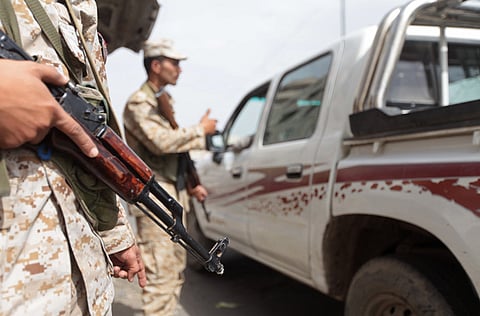Fierce clashes breach Yemen ceasefire
Al Houthis trying to close in on capital, are 10km from Sana’a airport

Sana’a: Fierce clashes broke out on Saturday between pro-government tribesmen and Al Houthi rebels near the Yemeni capital, as the president vowed that authorities will not tolerate any violence.
Al Houthis - also known as Ansarullah - have advanced out of their northern mountain strongholds towards the capital in a suspected attempt to expand their sphere of influence as Yemen is reorganised into six regions. The clashes breached a week-old ceasefire.
Clashes using machine guns and medium weapons raged in the villages of Darwan, Bani Maymun, Al Jaef and Al Maamar, in the northern town of Hamdan, around 10 kilometres from Sana’a International Airport, tribal and army sources said.
Further north in Amran province, tribal and military sources said that “fierce clashes” pitting troops and Al Houthi militants raged late Friday.
The sources spoke of “dozens” of casualties but the toll could not immediately be verified.
Meanwhile, in a speech marking the start of the fasting holy Muslim month of Ramadan, President Abd Rabbo Mansour Hadi denounced the violence.
“We will not allow any acts of violence here and there by any party trying to undermine security,” Hadi said in a statement carried by the official Saba news agency.
“All parties must comply with agreements reached to resolve latest tensions and fighting in Amran, Hamdan, Arhab, and Bani Matar” in the north, he said.
A Defence Ministry official said that heavy weapons and artillery were being used in the fighting in the northern city of Amran. Al Houthi rebels are fighting tribesmen from Yemen’s largest tribal confederation, the Hashid, which is backed by an army unit and allied with the Muslim Brotherhood. Al Houthis are backed by supporters from smaller tribes.
The official spoke on condition of anonymity because he was not authorised to speak to the press.
Mohammad Abdul Salam, the rebels’ spokesman, accused the Muslim Brotherhood’s Islah party in parliament of instigating the breach in the ceasefire.
The number of casualties was not immediately clear but over the past months hundreds have been killed and injured in similar clashes that have spilled to northern cities where rebels accuse ultraconservative Salafists of trying to spread their ideology in Al Houthi strongholds.
The Al Houthis waged a six-year insurgency in the north against ousted President Ali Abdullah Saleh, which officially ended in 2010.
Meanwhile, Yemeni officials accused Saleh and his loyalists of trying to stage a “coup” and roll back the country’s transition from his rule.
Hadi said that the country faced a “plot to abort the transitional political process” on June 11, when security forces say assailants set fire to tyres across the capital some 280 times and besieged dozens of trucks carrying fuel, causing a shortage. Assailants also struck power stations and grids, they added.
Electricty went out across Yemen that day and lines of cars waiting for fuel stretched outside petrol stations, amid reports of scattered demonstrations by armed men.
“This is aimed at bringing the wheel of history backward and taking us to square 1,” Hadi said, without giving the names of those behind the alleged plot.
On Friday, Prime Minister Mohammad Salem Basindwa said in an interview with Dubai TV that it was Saleh who “plotted a coup” by disrupting life and creating chaos in the streets on June 11.
Sign up for the Daily Briefing
Get the latest news and updates straight to your inbox



